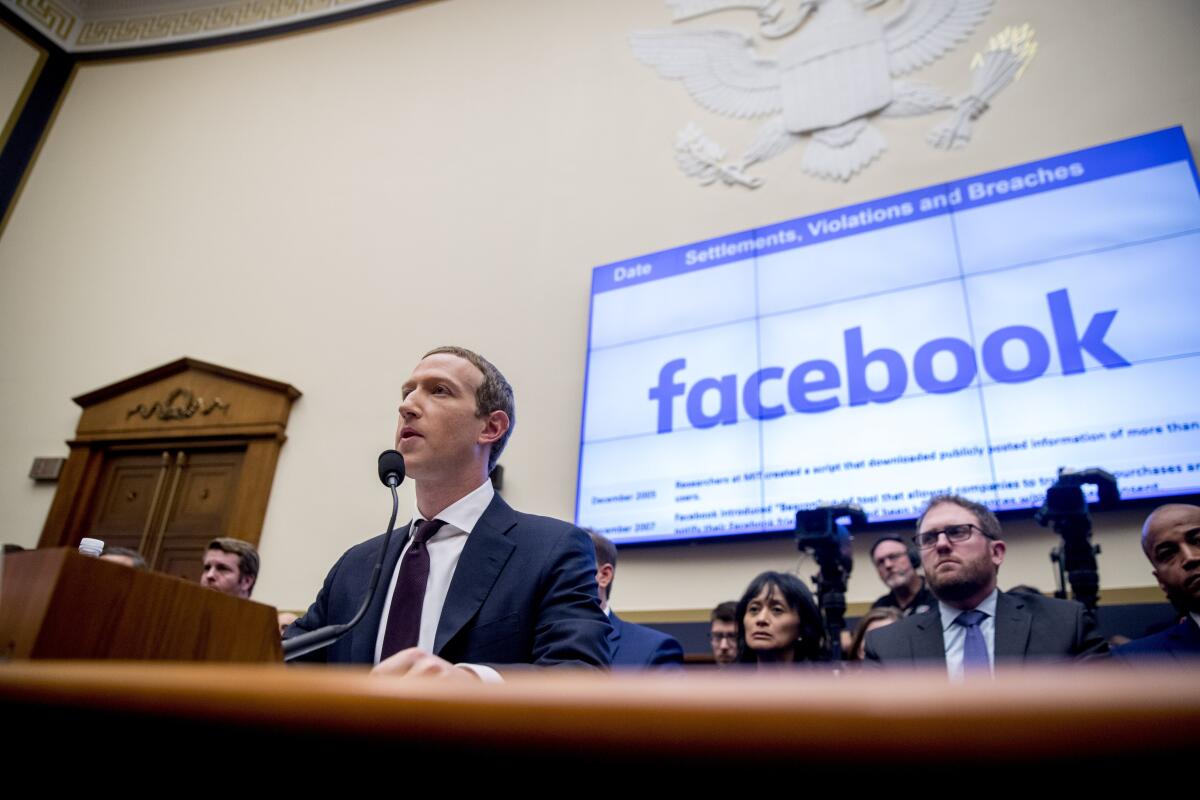Facebook’s Zuckerberg faces tough questions at congressional hearing on cryptocurrency

- Share via
Facebook Inc. Chief Executive Mark Zuckerberg struggled to convince Congress of the merits of the company’s plans for a cryptocurrency in light of all the other challenges the company has failed to solve.
From the start of Zuckerberg’s testimony to the House Financial Services Committee Wednesday, lawmakers made it clear that they weren’t just asking about the digital currency known as Libra, but about whether the 35-year-old executive should be trusted with the tremendous power his company has amassed over 2.7 billion global users of Facebook products.
Committee Chairwoman Maxine Waters said Facebook should stop work on its cryptocurrency project until the company addresses a series of unrelated “deficiencies” in its social-media business.
“You have opened up a serious discussion about whether Facebook should be broken up,” Waters, a California Democrat, told Zuckerberg.
During the CEO’s appearance, many of Washington’s grievances about Facebook were laid bare. There were heated questions about Facebook’s refusal to fact-check political ads; accusations of rampant child exploitation on the platform; Facebook’s move to encryption and the impact that would have on the ability to obscure criminals; the company’s preparation for the 2020 presidential election; and what it’s doing to prevent “deepfakes,” or manipulated videos.
Zuckerberg vowed to try to address lawmakers’ concerns but also said he hoped to “address the risk of not innovating. I don’t know if Libra is going to work, but I believe in trying new things.” He also acknowledged that it has been “a challenging few years for Facebook.”
Zuckerberg is well aware of the skepticism the cryptocurrency plan faces, not least because of the missteps Facebook has made regarding protecting data privacy.
Waters has been one of Congress’s loudest critics of Facebook’s effort to create the digital token. When the social-media giant first announced its plans in June, she almost immediately demanded that the company halt development.
Government officials and central bankers in Europe have also raised concerns about how the project would protect users’ privacy and prevent criminals from using it to launder money. Zuckerberg reiterated that he has no intention of launching the cryptocurrency without approval from regulators.
Though he had made the promise before, Zuckerberg took it a step further on Wednesday, saying that Facebook could even be forced to leave the Libra Assn. entirely if the group decides to move forward with the currency without approval from U.S. regulators. It’s an unlikely scenario, but Zuckerberg’s suggestion that Facebook could abandon a project it started is meant to appease lawmakers who have pushed back aggressively on the cryptocurrency.
Zuckerberg made the case that if the U.S. doesn’t lead in innovation, specifically in areas such as cryptocurrency, then China will leap ahead.
“We can’t sit here and assume that because America is today the leader that it will always get to be the leader if we don’t innovate,” he said.
But members of Congress poked holes in Zuckerberg’s argument that Libra would improve America’s dominance in finance around the world. If that were the case, why would Libra need a home base in Switzerland, with a global roster of members and need to be backed by multiple currencies beyond the U.S. dollar? How would the currency actually work, and would it allow transactions that were anonymous or nonrefundable?
Zuckerberg didn’t have many answers. The Libra product is still so hypothetical and is awaiting agreements among members about how it would function based on the response from governments about how they plan to regulate it. He said he didn’t know whether other Libra members were planning to contribute money to back the currency, and that the idea of anonymous transactions was still “an open question.”
Facebook originally had 27 partners that planned to join it in the Libra Assn., which will be led from Switzerland and is supposed to share in the governance of the cryptocurrency. Recently about one-fourth of those original members have dropped out, including PayPal Holdings Inc., Mastercard Inc. and Visa Inc. Zuckerberg said some of Libra’s early partners abandoned the project probably because it was risky and because of the intense regulatory scrutiny.
Zuckerberg came prepared with lofty arguments about Libra’s purpose: It would help reduce income inequality by giving people — including 14 million in the U.S. without access to bank accounts — an easier, faster and cheaper way to send money around the world. At the same time, it would secure America’s international financial leadership, since Libra would be backed mostly by the U.S. dollar, especially if the cryptocurrency were allowed to launch prior to similar planned efforts in China.
But it was clear from the beginning that Waters and others were prepared to be tough on Zuckerberg. For years he said his social network’s purpose was to “connect the world,” but that mission ended up as a grow-at-all-costs strategy pursued with blind spots around the harmful ways people were using the product. Zuckerberg last testified to congress in April 2018, answering 10 hours of questions about how Facebook allowed app developers to collect data on users, and how the platform was used by Russia to influence the 2016 presidential election.
Goals for the democratization of money aside, Facebook envisions Libra being incorporated into the company’s various messaging apps, including WhatsApp and Facebook Messenger. The company believes that the currency could help benefit its existing advertising business, or create opportunity for new revenue streams. Zuckerberg said Libra would eventually help boost Facebook’s advertising prices.
More to Read
Inside the business of entertainment
The Wide Shot brings you news, analysis and insights on everything from streaming wars to production — and what it all means for the future.
You may occasionally receive promotional content from the Los Angeles Times.










